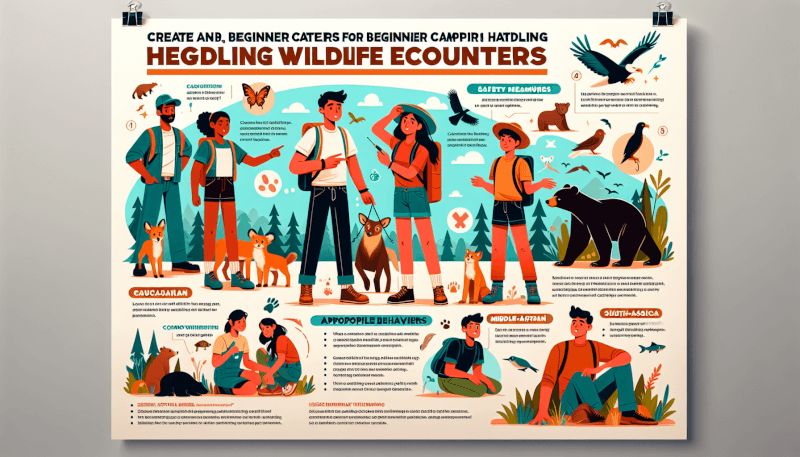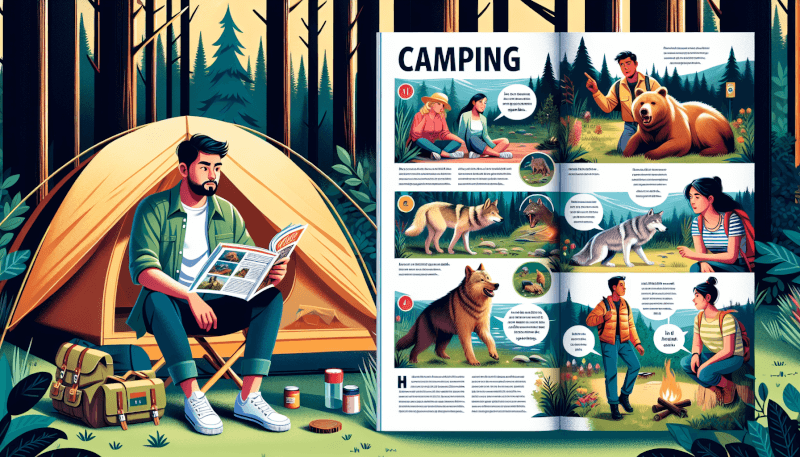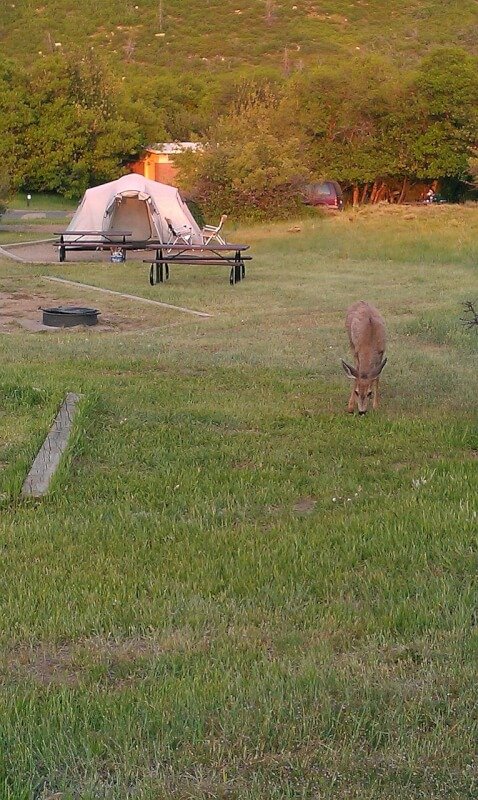If you’re a beginner camper, venturing into the great outdoors can be an exhilarating yet slightly nerve-wracking experience. The possibility of encountering wildlife adds an extra layer of excitement to your adventure, but it’s important to know how to handle these encounters safely. Whether it’s a curious bear, a slithering snake, or a mischievous raccoon, this article will guide you through the essential steps on what to do if you come face-to-face with wildlife while camping. So, lace up your hiking boots, grab your tent, and let’s get prepared for all the wonders that nature has in store for you!
Campsite Preparation
Choose a secure campsite
When it comes to choosing a campsite, safety should be your top priority. Look for a secure campsite that is away from known wildlife habitats, such as bear or cougar territories. In general, avoid camping near bodies of water, as they tend to attract animals looking for food and water. Also, pay attention to the terrain of the campsite – avoid areas with dense vegetation or hidden spots that could potentially surprise an unwelcome visitor. By selecting a secure campsite, you can minimize the risk of encountering wildlife in the first place.
Store food properly
Properly storing your food is crucial to prevent attracting wildlife to your campsite. This means keeping all food and scented items, such as toothpaste and deodorant, in airtight containers or lockable coolers. Store these containers out of reach and out of sight, either in your vehicle or by hanging them from a tree branch at least 10 feet off the ground and 4 feet away from the trunk. Remember, bears have a keen sense of smell and can easily be attracted by the scent of food, so taking these precautions is essential for your safety and for the well-being of the animals too.
Dispose of garbage correctly
Just as important as storing food properly is disposing of garbage correctly. Never leave any trash or food scraps at your campsite – pack it out with you. Leaving behind garbage not only attracts wildlife but can also disrupt their natural feeding patterns, endangering both the animals and future campers. Keep in mind that even seemingly harmless items like fruit peels or cans can be enticing to wildlife, so be diligent in cleaning up after yourself and leaving the campsite as clean as you found it.
General Safety Guidelines
Leave wildlife alone
When you encounter wildlife during your camping trip, it is important to remember that you are in their territory. While it may be exciting to spot a bear or a wolf, it is crucial to maintain a safe distance and observe from afar. Do not approach, touch, or attempt to feed any wild animals. Respecting their space and allowing them to go about their natural behaviors is not only essential for their well-being but also for your own safety.
Make noise to alert wildlife of your presence
While it is important to leave wildlife alone, it is equally essential to make your presence known. Animals like bears or cougars may not want to interact with humans, but they also don’t want to be startled or surprised by you. As you hike or move through their habitat, make noise by talking, singing, or clapping your hands. This will alert the animals to your presence and give them the opportunity to move away from you without feeling threatened.
Keep a safe distance
Maintaining a safe distance from wildlife is crucial for your safety. While the exact distance may vary depending on the animal and the situation, it is generally recommended to keep at least 100 yards away from bears, cougars, and moose. For animals like wolves or snakes, it is best to keep a distance of at least 30 yards. Remember, wild animals are unpredictable, and you should never attempt to approach them for a closer look or a photograph. Enjoy observing them from a safe distance and give them the space they need to thrive.
Encountering Bears
Stay calm and make yourself known
If you come across a bear during your camping trip, it’s important to remain calm and avoid panicking. Bears can sense fear and may become more aggressive if they feel threatened. Slowly back away from the bear while speaking calmly and firmly to let it know that you are there. Avoid making sudden movements or running, as this can trigger the bear’s chase instinct. By staying calm and making yourself known, you are more likely to diffuse the situation and allow the bear to move away peacefully.
Do not run or climb trees
Running from a bear is one of the worst things you can do. Bears are incredibly fast and are excellent climbers, so attempting to outrun or outclimb them is futile. Running away may trigger their predatory instincts and result in an aggressive chase. Instead, maintain a steady and slow pace as you back away from the bear. Running or climbing trees should never be your go-to response when encountering a bear.
Slowly back away while facing the bear
When encountering a bear, the key is to slowly back away while facing the bear and maintaining eye contact. This shows the bear that you are not a threat and allows it to keep track of your movements. Avoid turning your back to the bear, as sudden movements can trigger a predatory response. Remember to give the bear plenty of space to move away and never attempt to approach it for any reason. Your main goal is to create distance and allow the bear to go about its business without feeling threatened.
Encountering Wolves
Maintain eye contact and appear larger
If you happen to encounter a wolf during your camping adventure, it’s important to remain calm and assertive. Make sure to maintain eye contact with the wolf while slowly backing away. This helps establish a dominant presence and lets the wolf know that you are not easy prey. If you have children with you, pick them up and hold them close to appear larger and intimidate the wolf. Make yourself seem as formidable and confident as possible.
Make loud noises
To deter wolves from approaching you, make loud noises such as yelling, clapping, or using noise-making devices like whistles or air horns. Wolves are generally wary of humans and prefer to avoid confrontation. By making loud, assertive noises, you are sending a clear message that you are not to be messed with. This can often be enough to make the wolf retreat and give you the opportunity to safely distance yourself from the situation.
Do not turn your back
Just like with any wild animal encounter, never turn your back to a wolf. This can be interpreted as a sign of weakness and may provoke the animal into pursuing you. Always keep the wolf in your line of sight and back away slowly while maintaining eye contact. By staying aware of the wolf’s movements and keeping your body facing towards it, you are sending a clear message that you are in control and not presenting yourself as an easy target.
Encountering Cougars
Make yourself look bigger
If you find yourself face-to-face with a cougar, it’s important to make yourself look as big and intimidating as possible. Open your jacket or raise your arms to make yourself appear larger than you actually are. This can help deter the cougar from approaching you further. Cougars are generally cautious animals and prefer to avoid confrontations with humans. By making yourself look big, you are signaling that you are not an easy target.
Maintain eye contact
Maintaining eye contact with a cougar is crucial during an encounter. By doing so, you are showing the cougar that you are aware of its presence and that you are not afraid. Avoid making direct eye contact for too long, as this can be interpreted as a sign of aggression. Instead, keep a steady gaze while slowly backing away. This combination of maintaining eye contact and slowly creating distance can often diffuse the situation and allow the cougar to move on without feeling threatened.
Back away slowly
When encountering a cougar, the safest course of action is to slowly back away while facing the animal. Avoid turning your back or running, as this may trigger the cougar’s instinct to chase. Back away at a pace that allows you to maintain a cool and confident demeanor. Creating distance between you and the cougar is key, so take your time and don’t rush the process. Once you have put enough space between yourself and the cougar, you can safely continue your journey.
Encountering Snakes
Stay calm and freeze
If you come across a snake during your camping trip, it’s important to stay calm and freeze in place. Snakes have a keen sense of movement and can be easily startled by sudden actions. Standing still and freezing allows the snake to register your presence and identify you as a non-threatening entity. Avoid making any sudden movements or loud noises, as these can startle the snake and potentially provoke it into a defensive or aggressive response.
Give snakes a wide berth
To avoid any potential snake bites, it is crucial to give snakes a wide berth. Do not attempt to approach or handle the snake, no matter how harmless it may appear. Most snake bites occur when people try to interact or handle the snake, so for your safety, it’s best to admire them from a distance. Remember that snakes play an important role in maintaining the ecosystem, so it’s best to appreciate them from afar and let them go about their business undisturbed.
Slowly back away
If you find yourself in close proximity to a snake, the best course of action is to slowly back away. Maintain a calm and steady pace as you create distance between yourself and the snake. Be mindful of your surroundings and try to choose a path that allows you to distance yourself without getting any closer to the snake. By slowly backing away, you minimize the risk of provoking the snake and give it the space it needs to retreat.
Encountering Alligators
Keep a safe distance
When it comes to encountering alligators, the number one rule is to keep a safe distance. Alligators are powerful predators and should never be approached, especially in the wild. Maintain a minimum distance of 30 feet from an alligator on land and at least 60 feet if you encounter one in the water. Remember that alligators are quick both on land and in water, so keeping a safe distance is crucial for your safety.
Be cautious near water
Alligators are most commonly found near bodies of water, such as lakes, swamps, or rivers. When camping in areas known to have alligators, exercise caution near the water’s edge. Avoid swimming in water where alligators are known to inhabit and always keep a vigilant eye for any signs of their presence. Remember that alligators can move swiftly and silently, so it’s important to stay alert and be mindful of your surroundings.
Do not approach or feed them
Under no circumstances should you ever attempt to approach or feed an alligator. Feeding alligators is not only dangerous but also illegal in many areas. Feeding alligators encourages their association of humans with food and can lead to aggressive behaviors. Remember, alligators are wild animals and should be observed from a safe distance. Interacting with them in any way can be extremely hazardous and should be avoided at all costs.
Encountering Bees or Wasps
Remain calm and move away slowly
If you encounter bees or wasps during your camping trip, it’s important to remain calm and avoid making sudden movements. Most bees and wasps will only sting if they feel threatened, so it’s best to give them a wide berth. Slowly and calmly back away from the area, allowing the insects to continue with their normal activities undisturbed. Panicking or making sudden movements can agitate the insects and increase the chances of being stung.
Cover your face and protect your ears
If you find yourself being swarmed by bees or wasps, it’s important to protect your face and ears. These areas are particularly sensitive and can be more painful if stung. Use your hands or a hat to shield your face, and if possible, cover your ears with your hands or clothing. By protecting these vulnerable areas, you are reducing the risk of being stung and minimizing the potential impact on your camping experience.
Do not swat at them
Although your instinct might tell you to swat at bees or wasps, resist the urge. Swatting at them may further agitate the insects and increase the chances of being stung. Instead, calmly and slowly move away from the area, allowing the bees or wasps to disperse naturally. Remember, these insects play an important role in pollination and the ecosystem, so it’s best to coexist with them peacefully and give them the space they need to thrive.

Encountering Wild Boars
Avoid surprising or cornering them
Wild boars, also known as feral pigs, are generally shy creatures but can become aggressive if they feel threatened or cornered. To avoid any unnecessary confrontations, make noise as you move through their territory. This alerts the boars to your presence, giving them the opportunity to retreat before you get too close. Avoid entering dense vegetation or areas where visibility is limited, as these are favored hiding spots for boars. By being mindful and aware of your surroundings, you can minimize the chances of surprising or cornering them.
Back away slowly and quietly
If you happen to encounter a wild boar, the best course of action is to back away slowly and quietly. Sudden movements or loud noises can startle the boar and trigger an aggressive response. Maintain a steady pace as you create distance between yourself and the boar. Avoid direct eye contact, as this can be interpreted as a form of aggression. By giving the boar plenty of space and retreating calmly, you reduce the risk of any unwanted interactions.
Do not attempt to chase or provoke them
Under no circumstances should you ever attempt to chase or provoke a wild boar. These animals are capable of inflicting serious injuries with their sharp tusks and should be treated with respect. Remember, you are a visitor in their habitat, and it is crucial to coexist peacefully. Keep your distance, avoid any aggressive behaviors, and allow the boars to go about their daily routines undisturbed. By following these guidelines, you ensure your own safety and the well-being of the wild boars.
Encountering Moose
Give them plenty of space
If you come across a moose during your camping trip, it is important to give them plenty of space. Moose are incredibly powerful animals and can be unpredictable, especially during certain times of the year, such as mating or calving season. Maintain a safe distance of at least 100 yards and avoid approaching or attempting to interact with them. Remember, moose may appear calm and docile, but they can become aggressive if they feel threatened or provoked.
Do not approach or feed them
While moose may seem majestic and gentle, it is essential to remember that they are wild animals and should be treated as such. Never attempt to approach or feed a moose, as this can be dangerous for both you and the animal. Moose have a strong sense of personal space and may become agitated or aggressive if they feel intruded upon. Enjoy observing them from a safe distance and allow them to continue their natural behaviors without interference.
Make noise to alert them of your presence
Due to their large size, moose may not always be aware of your presence. To avoid surprising them, make noise as you move through their habitat. This can be as simple as clapping your hands, talking loudly, or wearing bells on your clothing. By making your presence known, you give the moose an opportunity to detect you from a distance and make any necessary adjustments to avoid a potential confrontation. Remember, prevention is key when it comes to moose encounters.
In conclusion, encountering wildlife while camping can be a thrilling and unforgettable experience. By following these guidelines and being prepared, you can ensure both your safety and the well-being of the animals. Remember to choose a secure campsite, store food properly, and dispose of garbage correctly to minimize the risk of attracting wildlife. When encountering animals, leave them alone, make noise to alert them of your presence, and maintain a safe distance. Whether it’s bears, wolves, cougars, snakes, alligators, bees, wild boars, or moose, knowing how to handle these encounters with respect and caution is key. Enjoy the beauty of nature and the wildlife it harbors, and remember to always be a responsible and conscientious camper.



